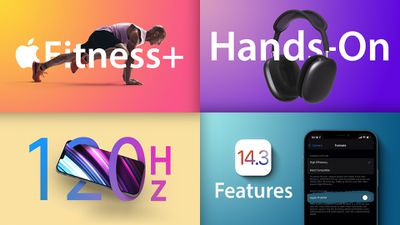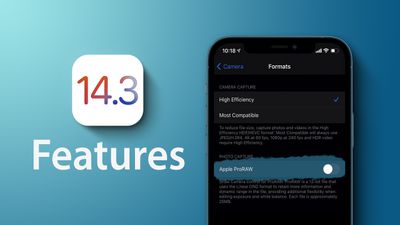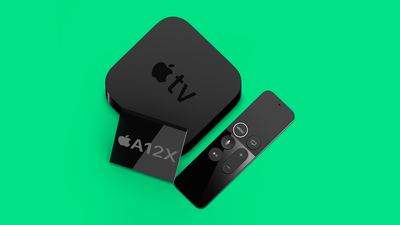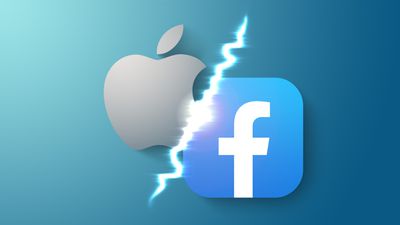Things remained extremely busy this week in the Apple world, even with the holidays quickly approaching. Apple pushed several new releases out the door on the hardware and software fronts this week, including AirPods Max, Fitness+, and other new features and improvements as part of iOS 14.3 and associated operating system updates.

We also got some rumors about the iPhone 13 and Apple TV, while Facebook and Apple remain engaged in an escalating dispute over Apple's upcoming move to require permission before companies can track users' online activity for personalized advertising purposes. Read on for details on all of these stories!
Hands-On With the AirPods Max
Apple's new AirPods Max over-ear headphones launched this week, and we've picked up a pair to see if their $549 price tag is worth it. We've also shared impressions from reviewers and customers.

AirPods Max feature a premium design, with a breathable mesh headband that connects to memory foam ear cups with stainless steel telescoping arms, and a large Digital Crown provides precise, tactile volume control. However, there is no power button, which will disappoint some users.
Sound quality and active noise cancellation are both impressive with the AirPods Max and competitive with over-ear headphones from competing brands like Sony and Bose. And with an Apple-designed H1 chip in each ear cup, the AirPods Max feature instant pairing and automatic switching for Apple devices, longer Bluetooth range, and more.
While the AirPods Max are quite heavy, the headphones have been fairly comfortable in our experience, at least over shorter periods of time. Some users have found the headphones to be heavier on their ears, rather than their head, as Apple says that it designed the headband to distribute weight and reduce on-head pressure.
Overall, the AirPods Max are certainly a quality pair of over-ear headphones, but the average person should definitely consider looking into highly-rated alternatives like Sony's WH-1000XM4 or Bose's Noise Cancelling Headphones 700 for hundreds of dollars less.
Apple Fitness+ Launches With Free Trial Available
Apple's new workout service Fitness+ is now available, providing Apple Watch users with studio-style, guided exercise videos in a range of categories, such as high-intensity interval training, yoga, dance, running, walking, cycling, strength, and more. Apple says new content will be added to the service each week.

Fitness+ requires an Apple Watch Series 3 or later, although workout videos can be watched on an iPhone or iPad without having an Apple Watch in close proximity once the service is set up. The videos can also be viewed on an Apple TV, but an Apple Watch is always required.
The headline feature of Fitness+ is that it integrates personal metrics such as heart rate from the Apple Watch to motivate users, animating them on the screen during key moments in the workout. All workout videos also offer modifications for beginners or those who prefer a slower pace.
Priced at $9.99 per month or $79.99 per year, Fitness+ automatically appears as a new tab in the Fitness app on iPhones running iOS 14.3 or later, while iPad users can get the Fitness app from the App Store for iPadOS 14.3 or later. On the Apple TV, the Fitness app automatically appears once users upgrade to tvOS 14.3. At launch, the service is available in the United States, Canada, Australia, New Zealand, Ireland, and the United Kingdom.
Fitness+ offers a free one-month trial to existing Apple Watch users, and an extended three-month trial is available to customers who purchased a new Apple Watch Series 3 or later after September 15, 2020.
iOS 14.3 Released — Here's Everything New!
Apple this week released iOS 14.3 and iPadOS 14.3 after a lengthy beta testing period, and there are several new features in the software updates.

In addition to Apple Fitness+ and AirPods Max support, other new features include support for Apple's new ProRAW image format, a dedicated TV+ tab in the TV app, a new pregnancy section in the Health app, privacy labels in the App Store, and more. And for iPad users, iPadOS 14.3 restores the ability to delete emails using the delete key on the Magic Keyboard.
Other software updates released this week include watchOS 7.2 with a new Cardio Fitness feature that measures VO₂ max, macOS 11.1, tvOS 14.3, and a 14.3 software update for the HomePod and HomePod mini.
iPhone 13 Pro Models Expected to Adopt LTPO Technology for 120Hz Display
Two out of four iPhone 13 models set to launch next year (presumably the Pro and Pro Max) will use OLED displays with low-power LTPO technology, paving the way for a long-rumored 120Hz refresh rate, according to a Korean supply chain report this week.

LTPO technology would result in a more power-efficient backplane, which is responsible for turning individual pixels on and off on the display. In turn, this could allow for a 120Hz refresh rate for more fluid scrolling and smoother motion without causing too much of a hit on battery life. Similar to recent Apple Watch models, LTPO could also enable iPhone 13 models to have an always-on display.
While some rumors had suggested that iPhone 12 Pro models would support a 120Hz refresh rate, display industry analyst Ross Young accurately claimed otherwise, noting that the feature will be added alongside LTPO in 2021. iPad Pro models have supported up to 120Hz since 2017.
New Apple TV Finally Expected Next Year
Apple finally plans to release a new Apple TV in 2021, according to the Nikkei Asian Review, over three years after last updating the streaming box.

The report did not reveal any potential features, but previous rumors have indicated that the next-generation Apple TV could be equipped with a variant of the A12 chip for faster performance, and possibly a gaming controller that would be beneficial for Apple Arcade. There may also be a new 128GB storage option, compared to a max of 64GB currently.
The current Apple TV 4K was released in September 2017 and looks virtually identical to the previous-generation Apple TV HD.
Apple Responds to Facebook's Anti-Tracking Criticism, Says Users Deserve Control and Transparency
Apple has responded to Facebook's criticism over an upcoming iOS 14 privacy measure — specifically a change that will require users to grant permission for their activity to be tracked for personalized advertising purposes starting early next year.

Apple emphasized that it welcomes in-app advertising and is not prohibiting tracking, but simply requiring apps to obtain explicit user consent in order to track users for personalized advertising purposes, providing users with more control and transparency.
"We believe that this is a simple matter of standing up for our users," said Apple, in a statement issued to MacRumors. "Users should know when their data is being collected and shared across other apps and websites — and they should have the choice to allow that or not. App Tracking Transparency in iOS 14 does not require Facebook to change its approach to tracking users and creating targeted advertising, it simply requires they give users a choice."
Facebook claimed that Apple's tracking change will have a "harmful impact on many small businesses that are struggling to stay afloat," adding that the new policy is "about profit, not privacy." Facebook said many apps and websites will have to start charging subscription fees or add more in-app purchase options to make ends meet, making the internet "much more expensive."
MacRumors Newsletter
Each week, we publish an email newsletter like this highlighting the top Apple stories, making it a great way to get a bite-sized recap of the week hitting all of the major topics we've covered and tying together related stories for a big-picture view.
So if you want to have top stories like the above recap delivered to your email inbox each week, subscribe to our newsletter!





















